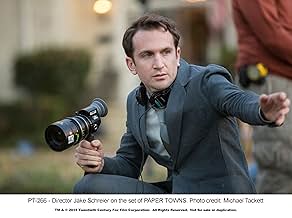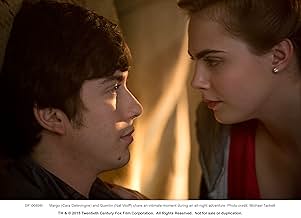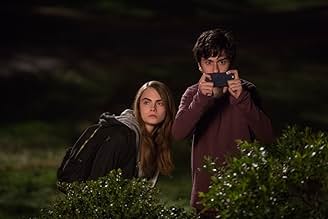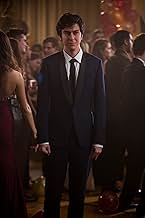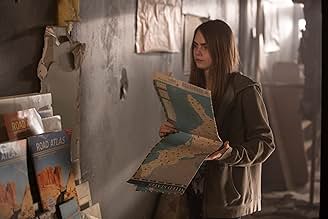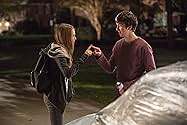IMDb रेटिंग
6.2/10
1.1 लाख
आपकी रेटिंग
अपनी भाषा में प्लॉट जोड़ेंAfter an all-night adventure, Quentin's lifelong crush, Margo, disappears, leaving behind clues that Quentin and his friends follow on the journey of a lifetime.After an all-night adventure, Quentin's lifelong crush, Margo, disappears, leaving behind clues that Quentin and his friends follow on the journey of a lifetime.After an all-night adventure, Quentin's lifelong crush, Margo, disappears, leaving behind clues that Quentin and his friends follow on the journey of a lifetime.
- निर्देशक
- लेखक
- स्टार
- पुरस्कार
- 4 जीत और कुल 3 नामांकन
Hannah Riley
- Young Margo
- (as Hannah Alligood)
फ़ीचर्ड समीक्षाएं
Coming on the heels of its commercially-successful predecessor, 'The Fault in Our Stars', PAPER TOWNS is no heavy tearjerker, but it echoes more affectionate and piercing sentiments, with its lighter, minimalist take of its recognizable subjects.
The film follows Quentin (Nat Wolff) , or "Q" as he is more popularly called, a highschool boy who has been nursing an unrequited love for the girl living next door, Margo (Cara Delevigne) since childhood. Even after when they turn 12, when Margo suddenly becomes distant, "Q" never loses the affection, and it only becomes even stronger when one day she climbs again to his window, the way she did when they were still kids. The next events follow an eager "Q" savoring the moment as he escorts Margo in her series of "small revenge" against those she thinks have betrayed her, including her ex-boyfriend. But the levitating moment would only last overnight, because the next day, the ever mystifying Margo, disappears.
Mining on the same overly familiar material that dwells on both coming-of-age and teenage romance territories, PAPER TOWNS pulls off two easily-recognizable efforts: maintaining 'The Fault's charm, while toning down its tragic notions. The latter of which, yields a more tangible and heartwarming result, capable of conjuring a lasting tug at the heartstrings. The credit for this goes to its equally-charming yet capable actors, both of whom teeming with fresh and enigmatic likability. It will also sound unforgivable to never pay regard to the film's brilliant screenwriters who manage to cleverly highlight this extremely familiar highschool tale's stronger and more relatable sentiments, genuinely and sincerely enough, to bend fragile emotions with crippling capacity.
"Q"'s road trip in finding Margo represents a bigger journey with far wider scope and meaning, and it comes across as a process of personal exploration that unknowingly liberates one self, toward finding the deeper sense of their existence. Hardly that the questions thrown get resolved, but the charming and sincere take of its proceedings, will ultimately make the narrative arrive to a satisfying conclusion. This doesn't mean it's able to satisfy its own queries, but the resolution delivered are nonetheless, reliable and honest.
PAPER TOWNS will come across as a witty, yet touching case of a 'lost and found'. Much of it is spent in searching for the 'lost', a liberating process that frees its seekers from every question that unfolds in the wake of a previous other, but the 'found', though never really answers any of the previous questions, will deliver a surprisingly satisfying, and never less of a rewarding, answer.
The film follows Quentin (Nat Wolff) , or "Q" as he is more popularly called, a highschool boy who has been nursing an unrequited love for the girl living next door, Margo (Cara Delevigne) since childhood. Even after when they turn 12, when Margo suddenly becomes distant, "Q" never loses the affection, and it only becomes even stronger when one day she climbs again to his window, the way she did when they were still kids. The next events follow an eager "Q" savoring the moment as he escorts Margo in her series of "small revenge" against those she thinks have betrayed her, including her ex-boyfriend. But the levitating moment would only last overnight, because the next day, the ever mystifying Margo, disappears.
Mining on the same overly familiar material that dwells on both coming-of-age and teenage romance territories, PAPER TOWNS pulls off two easily-recognizable efforts: maintaining 'The Fault's charm, while toning down its tragic notions. The latter of which, yields a more tangible and heartwarming result, capable of conjuring a lasting tug at the heartstrings. The credit for this goes to its equally-charming yet capable actors, both of whom teeming with fresh and enigmatic likability. It will also sound unforgivable to never pay regard to the film's brilliant screenwriters who manage to cleverly highlight this extremely familiar highschool tale's stronger and more relatable sentiments, genuinely and sincerely enough, to bend fragile emotions with crippling capacity.
"Q"'s road trip in finding Margo represents a bigger journey with far wider scope and meaning, and it comes across as a process of personal exploration that unknowingly liberates one self, toward finding the deeper sense of their existence. Hardly that the questions thrown get resolved, but the charming and sincere take of its proceedings, will ultimately make the narrative arrive to a satisfying conclusion. This doesn't mean it's able to satisfy its own queries, but the resolution delivered are nonetheless, reliable and honest.
PAPER TOWNS will come across as a witty, yet touching case of a 'lost and found'. Much of it is spent in searching for the 'lost', a liberating process that frees its seekers from every question that unfolds in the wake of a previous other, but the 'found', though never really answers any of the previous questions, will deliver a surprisingly satisfying, and never less of a rewarding, answer.
Paper Towns is another coming-of-age story about Quentin and his neighbour Margo and how here mysterious disappearance sends Quentin on a journey to find her through clues she left behind for him. Now i love a good coming-of-age story, so when one is done right and is new and interesting it will probably be something i choose to watch more than once. Unfortunately this will not be one i am eager to re-watch but it is still a good, strong attempt at one of these films but it seems to get lost a few times along the way in terms of its storytelling. I'll start with the characters and performances, because i feel they were definitely the best parts of the film and added so much to making the film pretty enjoyable. Nat Wolff was great at playing Quentin, a shy awkward guy who had a signs of a lot of personality but needed the right people to bring it out. You really get to connect with his character as they made him come across as very real and not like a character per se. I may say that often but there are so many young actors really showing off their best stuff in these smaller personal films. Cara Delevingne was also great as Margo who was also quite odd and mysterious but was also very out there and confident at the same time, a great contrast to Nat's character. The rest of the supporting cast were also well acted, their distinct personalities were at times used for some cheap comedic relief but also had a greater purpose in adding to the complexity of our main character.
The first act of this film is really where the film gets to shine. You get the introduction to these characters (Quentin and Margo) and get to see their relationship and how it has changed and affected both these characters in the lead up to the events in the film. Watching them interact and bond was fascinating and charming at times and was a really good lead up into the events of the second act and understanding their actions. It was fun, light-hearted and was setting itself up for something great. All of the events so far had a fluid lead in to the second act which became more of a mysterious adventure whilst still trying to maintain that fun element somewhat unsuccessfully. The events of the first act are what get you through the very long second act that could have been cut down like 20 minutes. The second act was more focused on building up Quentin's character and having him face some tough and new decisions in his life. Although it was interesting and you do want to see where his character goes it was a noticeable step down from the fun light-hearted enjoyment in the beginning. There was this great interesting relationship set up and you are eager to find out how the film ties everything together, then you reach the third act and all of the storytelling falls apart.
For certain characters, their actions and reactions seem somewhat justified but for some others they just felt like another character entirely. There was nothing in the second act that really explained how or why these characters made such a drastic change in reasoning or personality. They try to explain it in the dying minutes but it was very rushed and didn't fit with the rest of the film. The problem was that there was no real progression from the events of the beginning to the events in the end for some characters and that led me to believe that the writers/directors knew how to approach certain sections but were completely lost for others. I believe, they knew how they wanted the film to begin and how to introduce these characters, and they also knew how they wanted it to end and what themes they wanted to explore. But what they didn't know was how to show that transition, and when a film has the beginning, and has the end it can be hard to fill in the guts of the film afterwards and show a distinct character progression. That's just my theory but whatever happened the storytelling was a bit of a mess.
That being said, it was still a good enjoyable film that tried too hard to be different or maybe not hard enough. It had great characters and performances, a fantastic first act, an interesting second act and a third act that didn't live up to what the rest of the film was building up to. Humour didn't really work that often but kept the film from becoming too dark, and there were signs of emotion but nothing that really affects you. In the end, it's enjoyable but there are better coming-of-age films out there (Boyhood / Me and Earl and the Dying Girl). - 6.3
The first act of this film is really where the film gets to shine. You get the introduction to these characters (Quentin and Margo) and get to see their relationship and how it has changed and affected both these characters in the lead up to the events in the film. Watching them interact and bond was fascinating and charming at times and was a really good lead up into the events of the second act and understanding their actions. It was fun, light-hearted and was setting itself up for something great. All of the events so far had a fluid lead in to the second act which became more of a mysterious adventure whilst still trying to maintain that fun element somewhat unsuccessfully. The events of the first act are what get you through the very long second act that could have been cut down like 20 minutes. The second act was more focused on building up Quentin's character and having him face some tough and new decisions in his life. Although it was interesting and you do want to see where his character goes it was a noticeable step down from the fun light-hearted enjoyment in the beginning. There was this great interesting relationship set up and you are eager to find out how the film ties everything together, then you reach the third act and all of the storytelling falls apart.
For certain characters, their actions and reactions seem somewhat justified but for some others they just felt like another character entirely. There was nothing in the second act that really explained how or why these characters made such a drastic change in reasoning or personality. They try to explain it in the dying minutes but it was very rushed and didn't fit with the rest of the film. The problem was that there was no real progression from the events of the beginning to the events in the end for some characters and that led me to believe that the writers/directors knew how to approach certain sections but were completely lost for others. I believe, they knew how they wanted the film to begin and how to introduce these characters, and they also knew how they wanted it to end and what themes they wanted to explore. But what they didn't know was how to show that transition, and when a film has the beginning, and has the end it can be hard to fill in the guts of the film afterwards and show a distinct character progression. That's just my theory but whatever happened the storytelling was a bit of a mess.
That being said, it was still a good enjoyable film that tried too hard to be different or maybe not hard enough. It had great characters and performances, a fantastic first act, an interesting second act and a third act that didn't live up to what the rest of the film was building up to. Humour didn't really work that often but kept the film from becoming too dark, and there were signs of emotion but nothing that really affects you. In the end, it's enjoyable but there are better coming-of-age films out there (Boyhood / Me and Earl and the Dying Girl). - 6.3
Maybe I'm getting old. These over-serious, platitude-filled teen dramas used to only mildly annoy me. Now, with Paper Towns, I feel myself getting irrationally angry at its desperate plea to be this generation's The Breakfast Club. From where is that resentment coming? Maybe it's that I'm a 30-year-old married-father who's not meant to like this movie. Maybe it's that I'm coming off the high of the teen drama Me and Earl and the Dying Girl. Whatever it is, Paper Towns irritated much more than it charmed. The premise has potential: nerd spends one magically frivolous night with the enigmatic girl of his dreams, Margot, before she inexplicably disappears. Instead of being unique, stylish, or progressive, it becomes the lament of the rich-white-teen and the manic pixie dream girl. Our "hero" is drawn to her magnetic mystery, but that appeal never reaches the audience. At times, she represents an idea more than a character, but mostly she's an unbearably selfish, manipulative shrew, using her womanly wiles to get whatever she needs. When she's off-screen, the interplay between the friends is watchable, but her bothersome presence is never far away. Worst yet, in the end PT never takes a stance on Margot, like the movie is trying to have its cake and eat it too. Stylistically, the movie is forcefully quirky, annoyingly cutesy, and boasts a soundtrack that's like someone pushed the "hipster" button on a Casio Keyboard. We can only blame director Schreier, whose previous film was the under-seen Robot and Frank. Just stay home and watch that, a story about a machine with more humanity than anyone in PT.
"Paper Towns" is that kid in the lunchroom who acts different and seems cool but it isn't until you talk to him that you realize he adheres to all the social conventions and routines of life that you thought he was rebelling against. It's the kind of film that feels like it was written by an adolescent girl cherrypicking reblogged Tumblr quotes from her wall to suffice as the theme for the film. It's the kind of film you'll love if you find the idea of "getting lost to find yourself" a profound concept.
"Paper Towns," finally, is the kind of film where the love interest is named Margo Roth Spiegelman (Cara Delevingne), whose vacuous personality is mistaken for mystery and enigma. She is defined by her absent gazes into the world, her love for "random capitalization" in her writing because "the rules are so unfair to the letters in the middle of words," and her statements about her town, Orlando, Florida, being a paper town with "paper houses and paper people."
She also happens to be the apple of Quentin's (the former "Naked Brothers Band" lead singer Nat Wolff) eye since she moved in his subdivision when they were young; he considers living next to her his sole miracle in life. However, the two have significantly drifted since their youthful days of innocence, until one night when Margo climbs into his window and says that she has nine things to do that night and needs a getaway driver. Stunned that the love of his life has waltzed through his window for the first time in years, Quentin takes Margo and peels off in his minivan to exact revenge on Margo's cheating boyfriend and her friends who didn't help her in her time of need.
Upon having the greatest night of his life, Quentin wakes up the next morning and sees Margo isn't at school that day, and eventually, notices she's missing the entire week. Her parents aren't concerned, for Margo does this a lot, but Quentin and his friends - the incessant Ben (Austin Abrams) and the geeky "Radar" (Justice Smith) - begin to uncover clues as to why Margo may have disappeared and where to. With that, the three teens, including Margo's best friend Lacey (Halston Sage) and Radar's girlfriend Angela (Jaz Sinclair), try to track down her whereabouts.
"Paper Towns"'s immediate problem is it's nowhere as intelligent or witty as it thinks it is. Its themes are all rehashed to the point of breeding contempt and its characters, particularly Margo, are so broadly drawn that they work against the film, which is clearly trying to breathe that fabled freshness into the teen film genre (it always feels like Quentin's going to stop the film with his narration saying the dreaded "this isn't your average teen movie" line).
Strangely, though, the most contemptible character throughout this whole film is Margo for more reasons than her empty personality. She's the kind of person who thinks it's okay to drop her friends and family without giving them any inkling as to what's wrong with her because she's trying to find herself. Finally, when somebody does something for her, particularly Quentin, she takes it with a grain of salt and goes about selfishly trying to advance herself rather than consider what she means to others. She's on the verge of growing up and being Amy Schumer's Amy character from "Trainwreck," a contemptible, lost soul who takes advantage of people she meets.
Furthermore, the humor of "Paper Towns" is another thing that's frustrating. One moment, the film is trying to wow you with a "deep" dialogue about what lies beneath the surface of people, and the next, a character accidentally spills a can in which he urinated into all over himself and his friends. Once more, this is a film that's trying to be one thing but can't escape what it ultimately is: trite, frequently immature, and mostly empty exercise that has nothing revolutionary to say despite thinking it does.
However, don't fault the cast here, for they clearly give it their best shot. Their energy and charisma bring to life more than writers Scott Neustadter and Michael H. Weber (who wrote "The Spectacular Now," a film you should see instead of this one) do. Nat Wolff, an actor I've consistently admired for his good-natured, everyboy appearance and personality, does strong work here in that realm and is assisted by capable performers like Smith and Sage (Delevingne would likely be better if she had a character to play).
"Paper Towns" is cut from the same cloth as "The Fault in Our Stars" (author John Green, who wrote the book on which this film is based, also wrote that one and Neustadter and Weber also penned that screenplay) in that it tries to take a different direction for its adolescent characters but crumbles under the lackluster deviations from reality it so often takes. On top of that, unlike "The Fault in Our Stars," which was burdened by sentimentality and cringeworthy attempts at a perceived coolness, "Paper Towns" winds up being precisely what it didn't want to be - a paper film.
"Paper Towns," finally, is the kind of film where the love interest is named Margo Roth Spiegelman (Cara Delevingne), whose vacuous personality is mistaken for mystery and enigma. She is defined by her absent gazes into the world, her love for "random capitalization" in her writing because "the rules are so unfair to the letters in the middle of words," and her statements about her town, Orlando, Florida, being a paper town with "paper houses and paper people."
She also happens to be the apple of Quentin's (the former "Naked Brothers Band" lead singer Nat Wolff) eye since she moved in his subdivision when they were young; he considers living next to her his sole miracle in life. However, the two have significantly drifted since their youthful days of innocence, until one night when Margo climbs into his window and says that she has nine things to do that night and needs a getaway driver. Stunned that the love of his life has waltzed through his window for the first time in years, Quentin takes Margo and peels off in his minivan to exact revenge on Margo's cheating boyfriend and her friends who didn't help her in her time of need.
Upon having the greatest night of his life, Quentin wakes up the next morning and sees Margo isn't at school that day, and eventually, notices she's missing the entire week. Her parents aren't concerned, for Margo does this a lot, but Quentin and his friends - the incessant Ben (Austin Abrams) and the geeky "Radar" (Justice Smith) - begin to uncover clues as to why Margo may have disappeared and where to. With that, the three teens, including Margo's best friend Lacey (Halston Sage) and Radar's girlfriend Angela (Jaz Sinclair), try to track down her whereabouts.
"Paper Towns"'s immediate problem is it's nowhere as intelligent or witty as it thinks it is. Its themes are all rehashed to the point of breeding contempt and its characters, particularly Margo, are so broadly drawn that they work against the film, which is clearly trying to breathe that fabled freshness into the teen film genre (it always feels like Quentin's going to stop the film with his narration saying the dreaded "this isn't your average teen movie" line).
Strangely, though, the most contemptible character throughout this whole film is Margo for more reasons than her empty personality. She's the kind of person who thinks it's okay to drop her friends and family without giving them any inkling as to what's wrong with her because she's trying to find herself. Finally, when somebody does something for her, particularly Quentin, she takes it with a grain of salt and goes about selfishly trying to advance herself rather than consider what she means to others. She's on the verge of growing up and being Amy Schumer's Amy character from "Trainwreck," a contemptible, lost soul who takes advantage of people she meets.
Furthermore, the humor of "Paper Towns" is another thing that's frustrating. One moment, the film is trying to wow you with a "deep" dialogue about what lies beneath the surface of people, and the next, a character accidentally spills a can in which he urinated into all over himself and his friends. Once more, this is a film that's trying to be one thing but can't escape what it ultimately is: trite, frequently immature, and mostly empty exercise that has nothing revolutionary to say despite thinking it does.
However, don't fault the cast here, for they clearly give it their best shot. Their energy and charisma bring to life more than writers Scott Neustadter and Michael H. Weber (who wrote "The Spectacular Now," a film you should see instead of this one) do. Nat Wolff, an actor I've consistently admired for his good-natured, everyboy appearance and personality, does strong work here in that realm and is assisted by capable performers like Smith and Sage (Delevingne would likely be better if she had a character to play).
"Paper Towns" is cut from the same cloth as "The Fault in Our Stars" (author John Green, who wrote the book on which this film is based, also wrote that one and Neustadter and Weber also penned that screenplay) in that it tries to take a different direction for its adolescent characters but crumbles under the lackluster deviations from reality it so often takes. On top of that, unlike "The Fault in Our Stars," which was burdened by sentimentality and cringeworthy attempts at a perceived coolness, "Paper Towns" winds up being precisely what it didn't want to be - a paper film.
When reviewing a movie based on a book, should the reviewer make the movie's story part of the commentary, even if the movie's plot matches the book's plot closely? I say yes. And I'll go even further. I don't think it's necessary for the reviewer to read the book before reviewing the movie. Here's why: A movie reviewer reviews movies, not books. A movie has to stand on its own, whether the viewer has read the book or not (and, usually, the majority haven't). Now, if I haven't read the book, after I see the movie, I'll do some background research on the differences between the two so I can include that information in my review, but I'm still only going to judge aspects of the movie as they contribute to the whole. Take the movie "Paper Towns" (PG-13, 1:49) for example. Although I haven't read the book, I have read enough about the book to compare them, but I'm still only judging what appeared on screen.
I say all that to say this: "Live life to the fullest." There. I just saved you almost two hours. That's really all this movie is about. Didn't care for the story. Didn't care for the movie. Still, I do owe you more than that, so, as always, I'll tell you about the actors and the plot (without spoilers), I'll explain the grade I've given the movie, including what I think wasn't good and what was good (because, after all, there's some of both in almost every movie). And whether you think the book was better than the movie or the movie was better than the book is irrelevant. This is a movie review. Ya feel me? Cool. Onward and upward The movie takes its title from the 2008 book by John Green (author of "The Fault in Our Stars"). In the eyes of one of the story's central characters, paper towns are cities in which people ("paper people") go about their hum-drum lives without really living. The title also carries a literal real-world meaning. The title is a reference to the cartographers' practice of putting fake places onto the maps they make to deter copyright infringement (or catch anyone who does such infringing). These plagiarism traps have several names, including paper towns. One such paper town is Agloe (in New York State's Catskill Mountains), which is where the story's climax takes place. But the story begins in Orlando, Florida.
Quentin "Q" Jacobsen (Nat Wolff) fell in love with Margo Roth Spiegelman (model-singer-actress Cara Delevingne) when her family moved in across the street from his. Both kids were in elementary school, but it was love at first sight for him. It was friendship for her and then it wasn't even that. Q and Margo drifted apart. As high school seniors, they don't even acknowledge each other anymore. She's beautiful, free-spirited and mysterious (as she has always been) and hangs out with the other popular kids. Q is socially awkward and the opposite of adventurous and hangs out with his two best friends and fellow band students, Ben Starling (Austin Abrams) and Marcus "Radar" Lincoln (Justice Smith).
The action really starts one night when Margo crawls in through Q's bedroom window and asks to borrow his car to pull revenge pranks on her cheating boyfriend and others whom she feels have betrayed her. Q reluctantly agrees to be her getaway driver, and even helps a bit. Over the course of the night, he admits that he had fun and he begins to hope that this experience will rekindle his dormant friendship with Margo and maybe lead to something more. His hopes are soon dashed when Margo goes missing. Her parents believe that she has run away (for the fifth time), and now that she's 18, they aren't even going to look for her. Both Q and Lacey Pemberton (Halston Sage), Margo's best friend, want to know what happened to Margo, but they haven't a clue yet.
"Margo always loved mysteries," Q tells us in his brief narration at the beginning of the film. "So much that she became one." Margo may be a gone girl, but she left clues, which lead Q, Ben and Radar to search Margo's room, take her bedroom door off its hinges, go to an abandoned building in a shady part of town and, eventually take a long road trip, joined by Radar's girlfriend, Angela (Jaz Sinclair) and Lacey, on whom Ben has a crush (when he's not lusting after Q's mother). Through all this, the film omits some of the episodes in the book (as almost all film adaptations have to do), but keeps all the most important plot points (including the ending), as well as the "moral of the story".
"Paper Towns" has a worthwhile message, but takes as long to get there as driving from Florida to New York. The story's original enough, but it's highly unrealistic. The actors are appealing and the film treats the teens like real people, but they seem abnormally worldly for their ages and their angst sometimes annoyingly plays out as nothing more than (mostly) spoiled rich white kids complaining about their lives. Lastly, after emotionally investing (as much I could) in these characters, as well as almost two hours of my time, I found the ending frustrating. "Paper Towns" is as disappointing as a sightseeing trip to Agloe, New York. "C"
I say all that to say this: "Live life to the fullest." There. I just saved you almost two hours. That's really all this movie is about. Didn't care for the story. Didn't care for the movie. Still, I do owe you more than that, so, as always, I'll tell you about the actors and the plot (without spoilers), I'll explain the grade I've given the movie, including what I think wasn't good and what was good (because, after all, there's some of both in almost every movie). And whether you think the book was better than the movie or the movie was better than the book is irrelevant. This is a movie review. Ya feel me? Cool. Onward and upward The movie takes its title from the 2008 book by John Green (author of "The Fault in Our Stars"). In the eyes of one of the story's central characters, paper towns are cities in which people ("paper people") go about their hum-drum lives without really living. The title also carries a literal real-world meaning. The title is a reference to the cartographers' practice of putting fake places onto the maps they make to deter copyright infringement (or catch anyone who does such infringing). These plagiarism traps have several names, including paper towns. One such paper town is Agloe (in New York State's Catskill Mountains), which is where the story's climax takes place. But the story begins in Orlando, Florida.
Quentin "Q" Jacobsen (Nat Wolff) fell in love with Margo Roth Spiegelman (model-singer-actress Cara Delevingne) when her family moved in across the street from his. Both kids were in elementary school, but it was love at first sight for him. It was friendship for her and then it wasn't even that. Q and Margo drifted apart. As high school seniors, they don't even acknowledge each other anymore. She's beautiful, free-spirited and mysterious (as she has always been) and hangs out with the other popular kids. Q is socially awkward and the opposite of adventurous and hangs out with his two best friends and fellow band students, Ben Starling (Austin Abrams) and Marcus "Radar" Lincoln (Justice Smith).
The action really starts one night when Margo crawls in through Q's bedroom window and asks to borrow his car to pull revenge pranks on her cheating boyfriend and others whom she feels have betrayed her. Q reluctantly agrees to be her getaway driver, and even helps a bit. Over the course of the night, he admits that he had fun and he begins to hope that this experience will rekindle his dormant friendship with Margo and maybe lead to something more. His hopes are soon dashed when Margo goes missing. Her parents believe that she has run away (for the fifth time), and now that she's 18, they aren't even going to look for her. Both Q and Lacey Pemberton (Halston Sage), Margo's best friend, want to know what happened to Margo, but they haven't a clue yet.
"Margo always loved mysteries," Q tells us in his brief narration at the beginning of the film. "So much that she became one." Margo may be a gone girl, but she left clues, which lead Q, Ben and Radar to search Margo's room, take her bedroom door off its hinges, go to an abandoned building in a shady part of town and, eventually take a long road trip, joined by Radar's girlfriend, Angela (Jaz Sinclair) and Lacey, on whom Ben has a crush (when he's not lusting after Q's mother). Through all this, the film omits some of the episodes in the book (as almost all film adaptations have to do), but keeps all the most important plot points (including the ending), as well as the "moral of the story".
"Paper Towns" has a worthwhile message, but takes as long to get there as driving from Florida to New York. The story's original enough, but it's highly unrealistic. The actors are appealing and the film treats the teens like real people, but they seem abnormally worldly for their ages and their angst sometimes annoyingly plays out as nothing more than (mostly) spoiled rich white kids complaining about their lives. Lastly, after emotionally investing (as much I could) in these characters, as well as almost two hours of my time, I found the ending frustrating. "Paper Towns" is as disappointing as a sightseeing trip to Agloe, New York. "C"
क्या आपको पता है
- ट्रिवियाJohn Green: The author, as the voice of the shotgun-wielding father of Becca.
- गूफ़When Quentin enters the washroom at the party, the shower curtains are already open, but then later on you see Lacey opening the shower curtains.
- भाव
Quentin Jacobsen: What a treacherous thing to believe that a person is more than a person.
टॉप पसंद
रेटिंग देने के लिए साइन-इन करें और वैयक्तिकृत सुझावों के लिए वॉचलिस्ट करें
- How long is Paper Towns?Alexa द्वारा संचालित
विवरण
बॉक्स ऑफ़िस
- बजट
- $1,20,00,000(अनुमानित)
- US और कनाडा में सकल
- $3,20,00,304
- US और कनाडा में पहले सप्ताह में कुल कमाई
- $1,26,50,140
- 26 जुल॰ 2015
- दुनिया भर में सकल
- $8,55,12,300
- चलने की अवधि1 घंटा 49 मिनट
- रंग
- ध्वनि मिश्रण
- पक्ष अनुपात
- 2.35 : 1
इस पेज में योगदान दें
किसी बदलाव का सुझाव दें या अनुपलब्ध कॉन्टेंट जोड़ें








